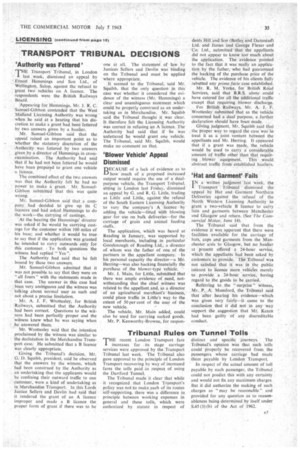TRANSPORT TRIBUNAL DECISIONS
Page 37

If you've noticed an error in this article please click here to report it so we can fix it.
'Authority was Fettered'
'THE Transport Tribunal, in London I last week, dismissed an appeal by Ernest Hemmings and Son Ltd., of Wellington, Salop, against the refusal to grant two vehicles on A licence. The respondents were the British Railways Board.
Appearing for Hemmings, Mr. J. R. C. Samuel-Gibbon contended that the West .Midland Licensing Authority was wrong when he said at a hearing that his discretion to make a grant had been fettered by two answers given by a haulier,
Mr. Samuel-Gibbon said that the appeal raised an important point as to whether the statutory discretion of the Authority was fettered by two answers given by a director of Hemmings in crossexamination. The Authority had said that if he had not been fettered he would have been prepared to grant one vehicle a licence.
The combined effect of the two answers was that the Authority felt he had no power to make a grant. Mr. SamuelGibbon submitted that this was quite wrong.
Mr. Samuel-Gibbon said that a company had decided to give up its -C licences and had asked Hemmings to do the work—the carrying of castings.
At the hearing the Hemmings' director was asked if he would be carrying castings for the customer within 100 miles of his base; and whether it would be true to say that if the application was granted he intended to carry outwards only for this customer. I To both questions the witness had replied " Yes ".
The Authority had said that he felt bound by these two answers.
Mr. Samuel-Gibbon admitted that it was not possible to say that they were on "all fours" with the statements made in that case. The answer in this case had been very ambiguous and the witness was talking about normal user as such and not about a precise limitation.
Mr. A. J. F. Wrottesley, for British Railways, submitted that the Authority had been correct. Questions to the witncss had been perfectly proper and the witness knew what he was saying when he answered them.
Mr. Wrottesley said that the intention proclaimed by the witness was similar to the declaration in the Merchandise Transport case. He submitted that a B licence was clearly appropriate.
Giving the Tribunal's decision, Mr. G. D. Squibb, president, said he observed that the answers by the witness, which had been construed by the Authority as an undertaking that the applicants would be confining their outward traffic to one customer, were a kind of undertaking as in Merchandise Transport. In this Lords Justice Sellers and Devlin had said that it rendered the grant of an A licence improper and made a B licence the proper form of grant if there was to be one at all. The statement of law by Justices Sellers and Devlin was binding on the Tribunal and must be applied where appropriate.
It seemed to the Tribunal, said Mr. Squibb, that the only question in this case was whether it considered the evidence of the witness (Mr. Hemmings) a clear and unambiguous statement which could be properly construed as an undertaking as in Merchandise. Mr. Squibb said the Tribunal thought it was clear. It therefore felt the Licensing Authority was correct in refusing an A licence. The Authority had said that if he was unfettered he would grant one vehicle. The Tribunal, said Mr. Squibb, would make no comment on that.












































































































